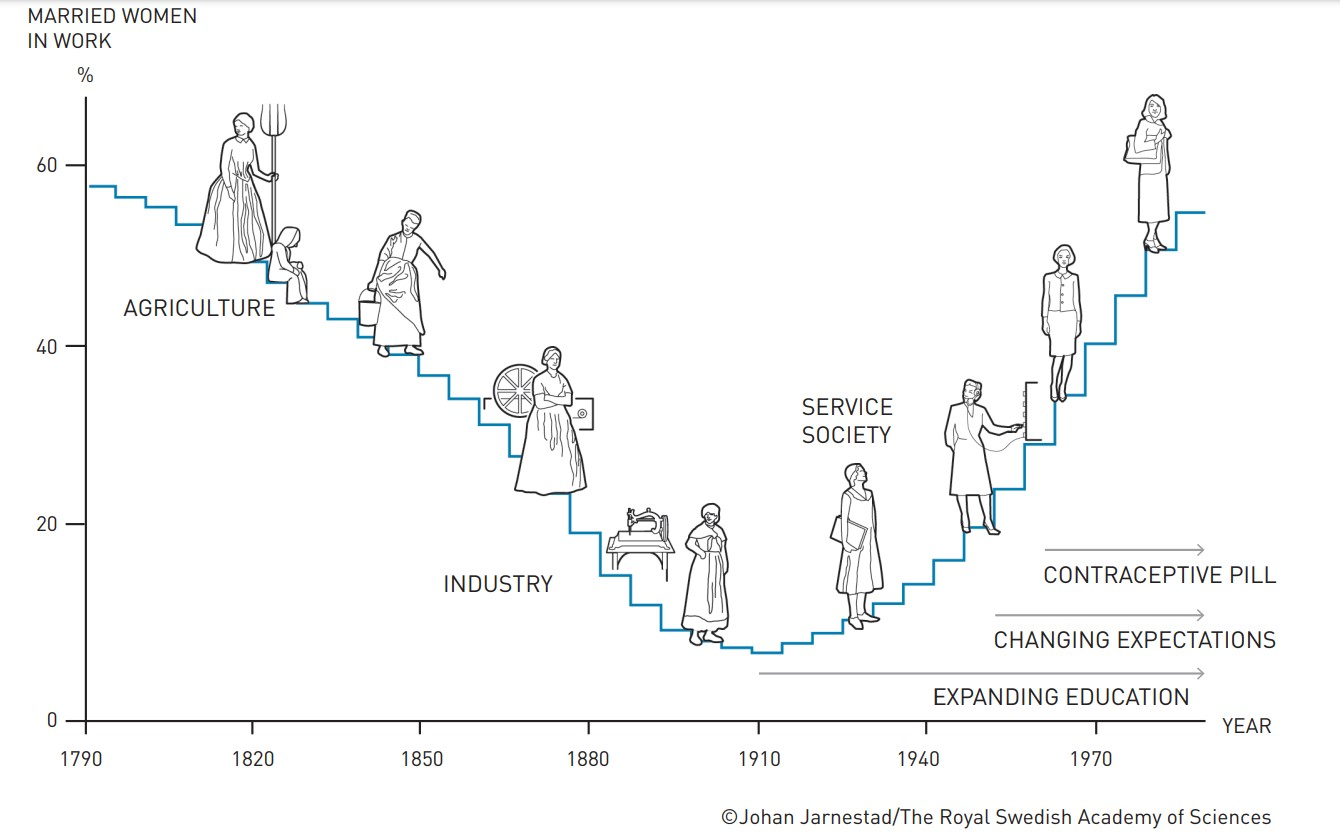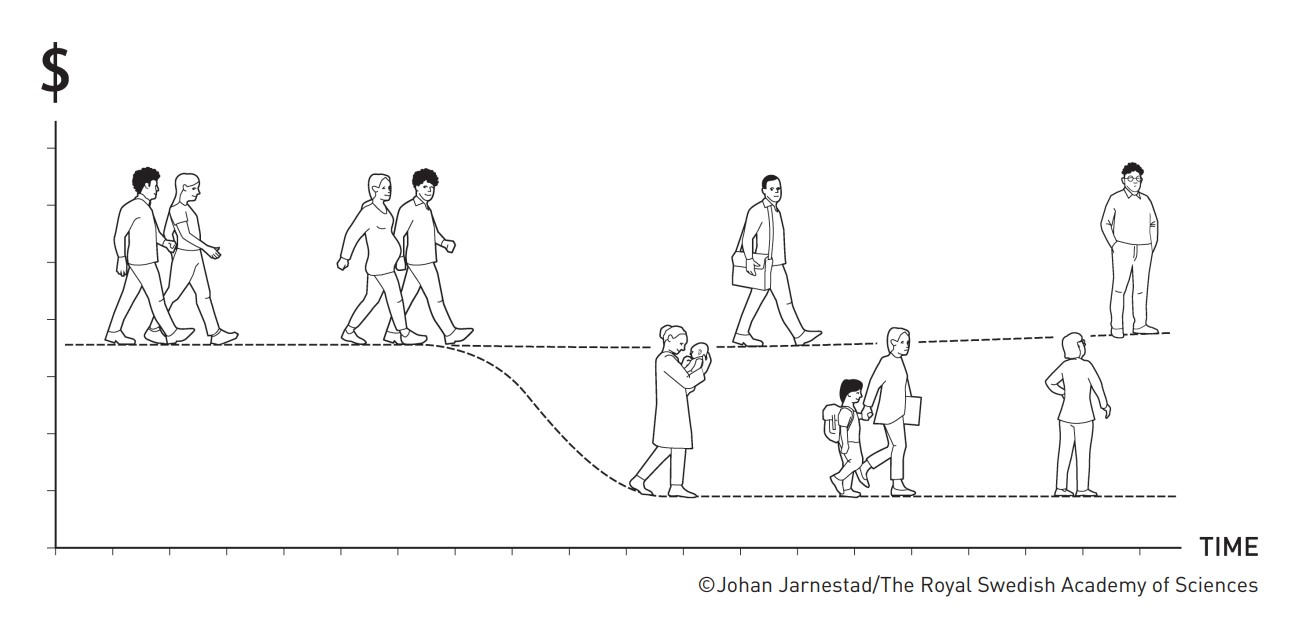On October 9, 2023, the Royal Swedish Academy of Sciences awarded the Alfred Nobel Prize in Economic Sciences to American Claudia Goldin. "For her research into the role of women in the labor market," the Nobel Committee said in a statement.
This news was widely reported by the world's media. But it would probably not be an exaggeration to say that out of 8 billion people living on the planet, only a few million actually understand what the 2023 Nobel Prize in Economics was awarded for.
Claudia Goldin is a respected and well-known scientist who has been studying the labor market and women in it for over 40 years. She has published many important works, some of which have turned the idea of women's work upside down in the broadest sense. The English-language version of Wikipedia reports that before the Nobel Prize, Claudia received at least 13 other prestigious awards for her work. I emphasize this so that it is immediately clear: she received this year's Nobel Prize not for a specific formula or pattern. But for 40 years of hard work, numerous studies and publications.
Employment does not depend on economic growth
And now to the point. The release published by the Nobel Committee notes several important discoveries by Claudia Goldin. One of them refutes the thesis, obvious to many, that as economic growth increases, the share of employed women also increases. In the “agrarian” pre-industrial era, the share of women engaged in productive labor was almost 60%. But in the process of industrialization, it decreased to less than 20%. And only today has it reached the figures of 200 years ago.
The explanation for this phenomenon is surprisingly simple. Before industrialization, women took a significant part in the “family business” because it was an integral part of the family. If a family farm earned a living by growing vegetables, the woman and the man (and in many cases the children, but not now) made a solidary contribution to the added value that was created.

As industrialization progressed, it became increasingly difficult for women to combine traditional household work and business. In addition, the weight of the so-called “marriage taboos” (all these “women’s place in the kitchen” and others) began to grow in society, which gained maximum strength in the 1930s. The paradox is that by this time the demand for women in the labor market had increased significantly due to the growth of the service and education sectors.
But the pressure of public opinion, the notion of a "correct" pattern of behavior for women, made gender equality in the labor market almost impossible. But this opinion should be understood correctly. For the most part, this is not about "bad men", but about a social trap.
Claudia Goldin shows in one of her works that a significant number of girls of that time made their own plans for life based on the classical life strategy. Therefore, young women chose professions and received education that did not require a significant investment of time. Why, if in a couple of years you will still get married, give birth to one, two, or three children and take care of them for many more years? So even those women who decided to return to their careers after all the maternity leave turned out to be unnecessary in the labor market.
Why women earn less money
During the second half of the last century, the situation began to change dramatically. The advent of modern contraceptive methods, which made it possible to plan the birth of children, leaving time for a career, and changing the parameters of the social contract regarding the role of women and their right to a career led to an increase in the share of employed women to about 50%. But for men, this share is 80%.
And another paradox: women, on average, have a better level of education, modern legislation in many developed countries prohibits setting different salaries for women and men. Despite this, on average, women receive 10-20% less salary than men.
Claudia Goldin also explains this phenomenon. It's about having children. Up until that point, she argues, there's no difference between men and women in pay. But after having a child, women start to fall behind. Even if they're in the same profession and have the same level of education.

Again, not all cases are about a “patriarchal conspiracy.” Many women make this choice quite consciously. They change work that requires full involvement for one that can be done in a couple of free hours. But there are still many who ultimately become hostages of “reproductive” labor.
Women drive the economy
The last term – reproductive labor – is not undisputed. But it is the best explanation. Reproductive labor is essentially unpaid domestic work: from cooking and washing, to caring for children and their education.
I don’t think it needs to be explained to Ukrainians that in our country, it is mostly women who do it, without receiving any pay for it. This is neither bad nor good – it just is. So it turns out that women do do the work. Hard, extremely important work, not regulated by any labor codes, not limited by time limits or days of the week.
By taking responsibility for such work, whether voluntarily or not, women thus enable men to work, create GDP, develop innovations, and receive Nobel Prizes.
No, I do not mean to say that all women are victims of a patriarchal society. Some people even like this philosophy of life, while others have to admit that the situation has improved significantly over the past 50 years. However, I would like both men and women to at least start looking at “reproductive” work as an extremely important component of the modern economy. Yes, it does not create added value, the budget does not benefit from it. But the reproductive work of one person frees up time for the productive work of another. Or the other. After all, men also do housework, repairing a faucet or assembling an IKEA crib for a child.
And even better, Claudia Goldin's work would be a step towards the dreamed-of "gender equality" at least at the family level. When both husband and wife bear joint responsibility for household duties. From borscht to raising a child. From walking the dog to home accounting and paying utility bills. Respecting and appreciating each other's reproductive work and allowing both to develop their careers, work, create, and relax.
And to Claudia Goldin – sincere congratulations on her well-deserved award.










